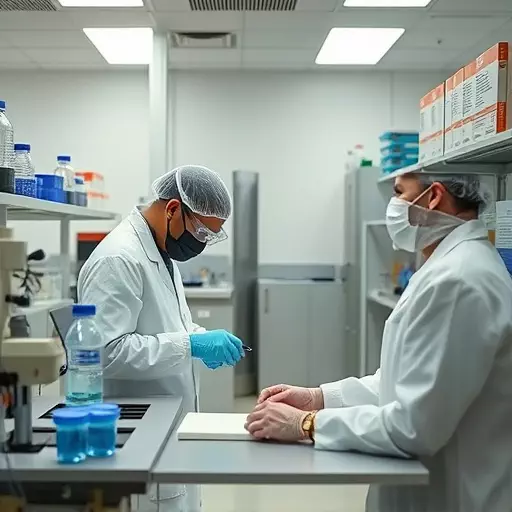The rapid expansion of subscription-based diagnostic services globally presents unique challenges for international sample transport in Ann Arbor. Key issues include navigating diverse regulations, maintaining time sensitivity and preventing sample loss during transit, and addressing potential job displacement due to automation in labs. Effective strategies involve leveraging automation technologies, establishing secure logistics processes with standardized procedures, digital tracking, and clear communication protocols. The growth of subscription-based diagnostic services offers advantages like increased efficiency and convenient patient access to testing, while also demanding careful integration to mitigate the social impact on lab workers through equitable reskilling and adaptive measures. By balancing these factors, Ann Arbor's scientific community can harness automation's benefits, ensure high-quality healthcare service delivery, and set a benchmark for global scientific collaboration.
“Navigating the complexities of cross-border sample transport is a critical yet challenging aspect of global healthcare. This article delves into the intricate web of issues faced by laboratories engaged in international sample sharing, focusing on Ann Arbor’s experiences in lab work. We explore regulatory hurdles and logistical nightmares, where every step from collection to processing matters. Additionally, we analyze the impact of automation on job displacement and efficiency, and discuss the growth of subscription-based diagnostic services as a global healthcare trend. By examining best practices and case studies, we offer insights into overcoming challenges, ensuring quality, and enhancing security in international sample transport.”
- The Complexities of Cross-Border Sample Transport: Navigating Regulatory Barriers and Logistics
- Automation in Laboratories: A Double-Edged Sword for Job Displacement and Efficiency
- Subscription-Based Diagnostic Lab Services: Growth and Implications for Global Healthcare
- Addressing Challenges: Best Practices for Ensuring Quality and Security in International Sample Sharing
- Case Studies: Success Stories of Overcoming Cross-Border Logistics and Processing Hurdles in Lab Work in Ann Arbor
The Complexities of Cross-Border Sample Transport: Navigating Regulatory Barriers and Logistics

The process of transporting samples across borders for lab work in Ann Arbor or any other location presents a unique set of challenges, especially with the evolving landscape of diagnostic services. As the subscription-based diagnostic lab services industry grows, addressing automation-related job displacement becomes increasingly crucial. The complexities arise from navigating regulatory barriers that vary significantly between countries, ensuring compliance with local laws and standards. Each nation has its own stringent guidelines regarding sample handling, storage, and transportation, which can be a significant hurdle for international collaboration in lab work.
Logistics also play a pivotal role in this intricate process. Time-sensitive samples require efficient and secure transit to avoid any potential degradation or loss during transport. The coordination of customs clearance, documentation, and adherence to special handling requirements adds another layer of complexity. These challenges demand meticulous planning and often necessitate partnerships with specialized logistics providers who understand the nuances of cross-border sample transport, ensuring that lab work proceeds smoothly and meets all necessary regulatory compliance, particularly in the rapidly growing subscription-based diagnostic services sector.
Automation in Laboratories: A Double-Edged Sword for Job Displacement and Efficiency

The integration of automation in laboratories presents a double-edged sword for both efficiency and employment in Ann Arbor’s scientific community. While automated systems can streamline lab work, enhance precision, and increase productivity, they also raise concerns about job displacement. As the growth of subscription-based diagnostic lab services gains traction, many traditional roles could be at risk. This shift towards automation necessitates addressing the potential social impact on lab workers to ensure a smooth transition that supports affected professionals.
On one hand, automated technologies can handle repetitive tasks, reducing human error and accelerating sample processing. However, these advancements may lead to fewer positions for highly skilled technicians, requiring adaptive reskilling programs to prepare the workforce for new roles. Balancing automation’s benefits with social equity considerations is crucial to harnessing its potential without leaving behind a segment of the scientific community in Ann Arbor.
Subscription-Based Diagnostic Lab Services: Growth and Implications for Global Healthcare

The landscape of healthcare diagnostics is witnessing a significant shift with the rapid growth of subscription-based lab services in Ann Arbor and globally. This innovative model offers patients regular, often preventive, access to diagnostic testing through monthly subscriptions, revolutionizing how medical care is delivered. By streamlining lab work processes, these services address automation-related job displacement in labs, ensuring efficient and timely results. The convenience and affordability they provide are particularly appealing for chronic disease management and personalized healthcare.
This trend has profound implications for global healthcare. It promotes proactive health monitoring, potentially reducing the burden on traditional healthcare systems. Moreover, subscription models can make advanced diagnostic services more accessible, bridging geographical gaps. As lab work in Ann Arbor and beyond evolves to meet this demand, addressing automation’s impact on jobs becomes crucial. Ensuring a smooth transition and reskilling of lab personnel is essential to maintaining high-quality healthcare service delivery while harnessing the benefits of this growing sector.
Addressing Challenges: Best Practices for Ensuring Quality and Security in International Sample Sharing

In today’s globalized scientific landscape, cross-border sample transport and processing have become increasingly common, driven by advancements in lab work in Ann Arbor and the growth of subscription-based diagnostic lab services worldwide. However, this trend presents significant challenges that require proactive addressing to ensure quality and security. One of the primary concerns is the potential for automation-related job displacement in labs, necessitating a delicate balance between technological innovation and maintaining skilled personnel.
Best practices for navigating these complexities involve implementing robust quality control measures at every stage of sample transport, from collection to processing. This includes utilizing secure packaging and transportation methods, as well as establishing clear communication protocols between sending and receiving laboratories. Additionally, adopting standardized operating procedures and leveraging digital technologies for tracking and monitoring samples can enhance transparency and accountability. As the industry evolves, labs must stay attuned to emerging trends, such as the increasing demand for international sample sharing in medical research and clinical trials, to ensure that their practices remain aligned with global standards and best serve the scientific community.
Case Studies: Success Stories of Overcoming Cross-Border Logistics and Processing Hurdles in Lab Work in Ann Arbor

In the vibrant scientific landscape of Ann Arbor, lab work has experienced transformative changes, showcasing successful strategies for overcoming cross-border logistics and processing challenges. The city’s thriving research community has been instrumental in navigating complex issues related to the transport of biological samples across international borders, a process often fraught with regulatory hurdles and time-sensitive constraints. One notable approach is the growing adoption of automation technologies, addressing automation-related job displacement in labs while enhancing efficiency. Advanced automated systems streamline sample processing, from collection to analysis, reducing manual intervention and minimizing errors.
Moreover, the rise of subscription-based diagnostic lab services has played a pivotal role. This innovative business model enables seamless cross-border collaboration by providing accessible, integrated platforms for researchers worldwide. By leveraging these platforms, scientists in Ann Arbor can efficiently manage sample transport, ensuring timely arrival and maintaining data integrity. This success story highlights how strategic adaptations to modern trends in lab work, such as automation and subscription services, can significantly improve cross-border logistics and processing, setting a benchmark for other regions seeking to enhance their scientific capabilities.
